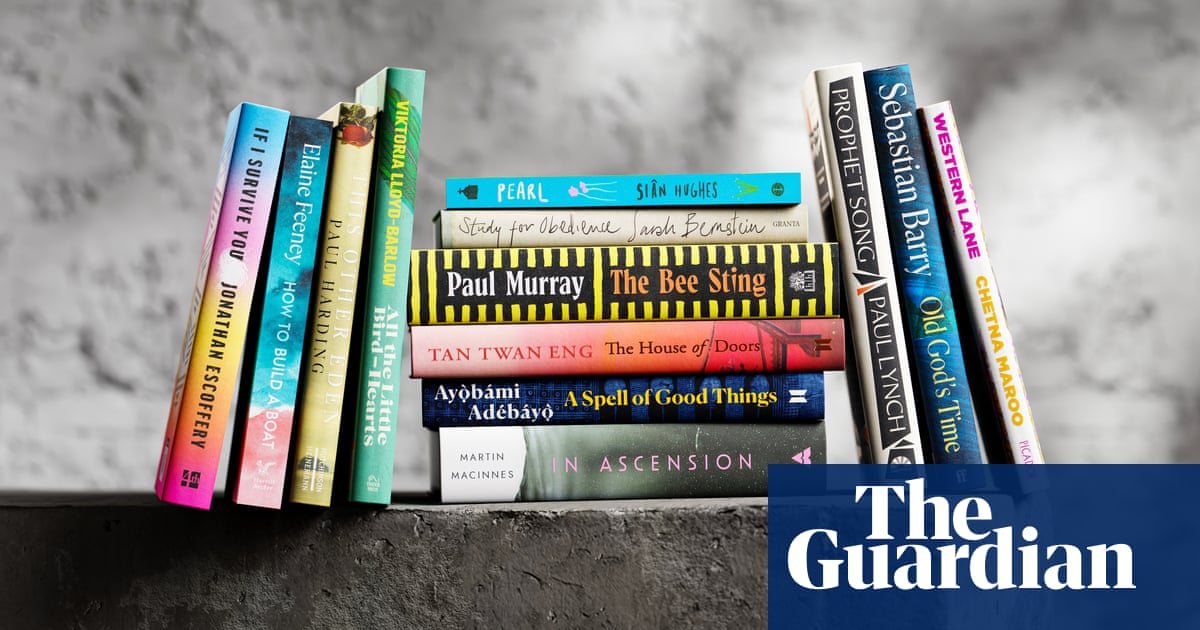
Kazuo Ishiguro first won the Booker prize in 1989 for The Remains of the Day. Thirty-one years later, the British author has made the longlist for the £50,000 award with Klara and the Sun, his first novel since winning the Nobel prize in literature.
Ishiguro’s story of an AF, or “artificial friend”, which is bought as a companion for a 14-year-old girl, is one of 13 novels in the running for this year’s Booker, the most prestigious books prize in the UK. The author, who has been shortlisted three times, was praised by judges for his “haunting narrative voice – a genuinely innocent, ego-less perspective on the strange behaviour of humans obsessed and wounded by power, status and fear”.
“It’s not just a novel about a technological future,” said judge Rowan Williams, the writer and former archbishop of Canterbury. “It is a novel about power, the nature of personality, about freedom and about love.”
Ishiguro makes the cut alongside some heavyweight names, from Richard Powers, chosen for the yet-to-be-published Bewilderment, about a widowed astrobiologist trying to raise his nine-year-old son, to Rachel Cusk, longlisted for Second Place, in which a woman invites an artist to visit the remote coastal region where she lives.
Sally Rooney, who was nominated for the Booker for her 2018 novel Normal People, was overlooked by judges for her third novel, Beautiful World, Where Are You, which is out in September. Judges also failed to longlist Don DeLillo’s short novel The Silence.
“Most of us had one or two favoured novels that really struck us, but we couldn’t persuade the others, or sometimes there was a novel where we thought this was a really really good, thoroughly satisfying novel, but does it quite break the new ground or change the horizon in the way we hope a Booker winner would?” said Williams.
“When you think of what’s won the Booker over the years, you want something that puts down a slightly fresh marker … That’s not to say you look for novelty for its own sake. The other thing about a Booker winner is that it ought to be a book that people enjoy reading, call me old-fashioned if you like. You don’t want something that is so experimental as to be highly satisfying to the author and a few ultra-sophisticated critics. You do want something that will keep people turning the pages.”
Director of the Booker Prize Foundation Gaby Wood said that while recent Booker longlists have “drawn attention to various elements of novelty in the novel: experimentalism of form, work in unprecedented genres, debut authors”, this year’s list was “more notable for the engrossing stories within it, for the geographical range of its points of view and for its recognition of writers who have been working at an exceptionally high standard for many years”.
The Booker’s globe-spanning lineup moves from Sri Lankan author Anuk Arudpragasam’s A Passage North, in which Krishan travels from Colombo to the war-torn Northern Province for a funeral, to the twice Booker-shortlisted author Damon Galgut’s The Promise. Set on a farm outside Pretoria, The Promise tells of a white South African family that has failed to keep a promise to the black woman who has worked for them her whole life.
Galgut is joined on the longlist by fellow South African author Karen Jennings, whose novel An Island, following an old lighthouse keeper who finds the unconscious body of a refugee on his beach, is published by small independent press Holland House Books.
The books world has long complained about the Booker’s decision to open its doors to American authors. This year, five British authors make the longlist, alongside four Americans. Ishiguro and the British-Canadian Cusk’s novels are joined by fellow Britons Francis Spufford’s Light Perpetual, which imagines a future for five children killed in the blitz, Sunjeev Sahota’s China Room, which weaves together the story of a young bride in rural 1929 Punjab with that of a young man in 1999, and British-Somali author Nadifa Mohamed’s The Fortune Men, in which suspicion falls on Mahmood Mattan for the murder of a shopkeeper in Cardiff’s Tiger Bay in 1952.
The Pulitzer-winning Powers, meanwhile, is joined by fellow Americans Patricia Lockwood, chosen for her buzzed-about debut No One is Talking About This, in which real life intrudes on the world of a woman known for her viral social media posts, Maggie Shipstead’s story of a female aviator who disappears in 1950 while attempting to fly around the world, Great Circle, and Nathan Harris’s first novel The Sweetness of Water, set at the end of the American civil war.
The longlist is completed by Canadian author Mary Lawson’s A Town Called Solace, set in Northern Ontario in 1972, when eight-year-old Clara’s sister Rose goes missing.
Williams and his fellow judges – chair Maya Jasanoff, the historian; writer and editor Horatia Harrod; actor Natascha McElhone; novelist and professor Chigozie Obioma – read 158 books to come up with their longlist of 13.
According to Jasanoff, the books are united by “their power to absorb the reader in an unusual story, and to do so in an artful, distinctive voice”.
“Many of them consider how people grapple with the past – whether personal experiences of grief or dislocation or the historical legacies of enslavement, apartheid and civil war. Many examine intimate relationships placed under stress, and through them meditate on ideas of freedom and obligation, or on what makes us human,” said Jasanoff. “It’s particularly resonant during the pandemic to note that all of these books have important things to say about the nature of community, from the tiny and secluded to the unmeasurable expanse of cyberspace.”
The shortlist of six books will be announced on 14 September, and the winner on 3 November.












